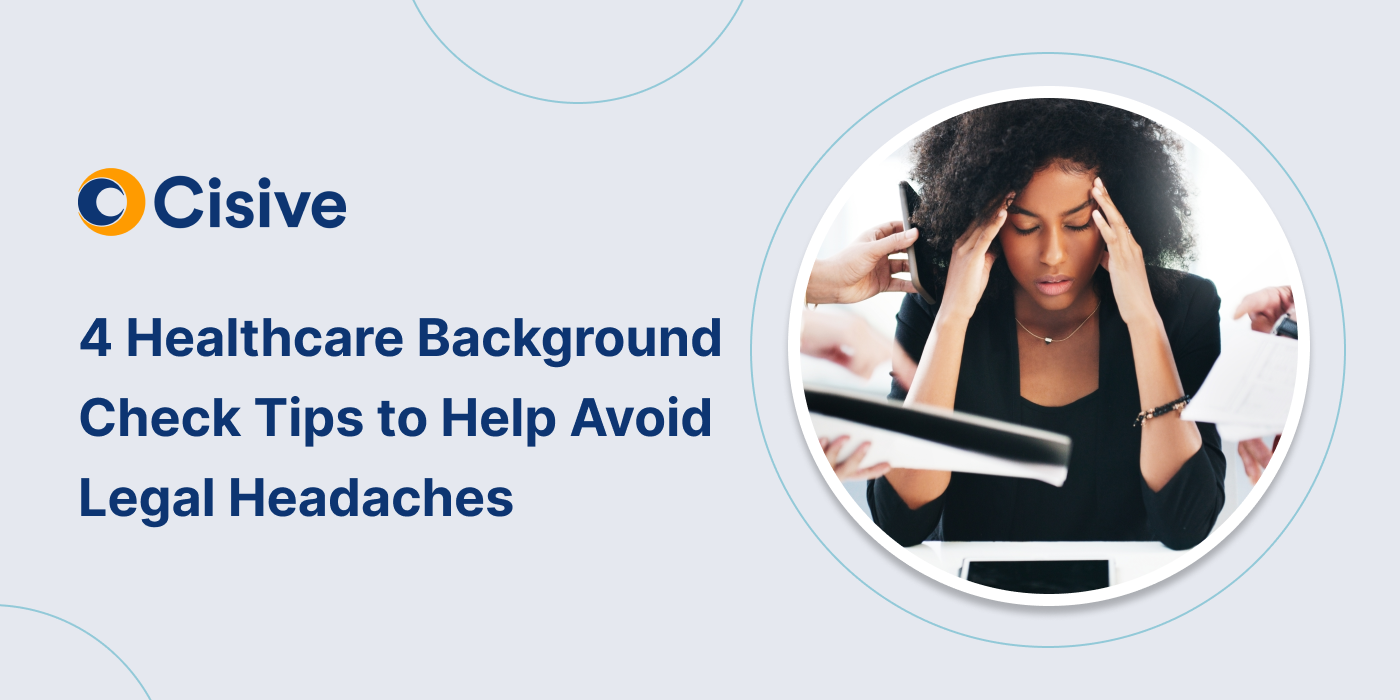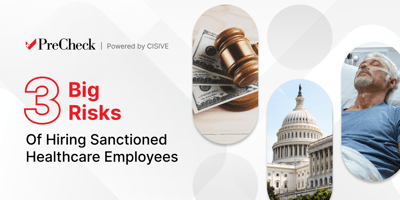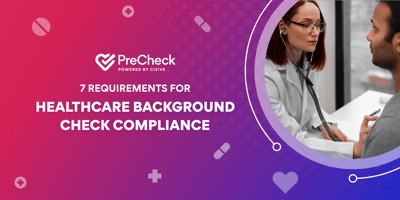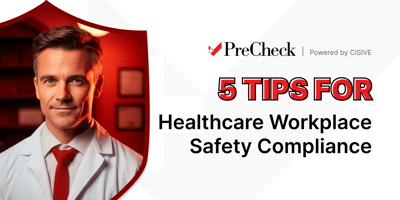

Healthcare sanctions background checks play a vital role in safeguarding patients, protecting...

Healthcare background check compliance is a critical component of the hiring process. Who you hire to work in healthcare settings directly affects the safety of patients, staff, and visitors.
With a better understanding of healthcare background checks and why they matter, you can design and maintain a background check program that allows you to hire qualified, responsible individuals while minimizing risks and liabilities.
Background checks on individuals help identify potential criminal activity, substance use, or inappropriate behaviors that could negatively affect your institution.
By conducting background checks, healthcare institutions can see and verify an individual’s work and personal history — allowing your talent acquisition team to make more informed hiring choices. The goal is to hire only individuals who are qualified and have undergone due diligence.
Because healthcare is a highly regulated field, you need to be sure that employees have the licenses, credentials, and immunizations required for their job. Further, depending on the role they hold, the type of care offered, and in some cases the state they provide care in, what is considered due diligence can vary. A comprehensive background screening provider can verify and check on many of these elements, providing the background information you need to make sound decisions.
Recommended Reading: The Evolving Role of MSPs in a Post-COVID World
Background check requirements for healthcare workers vary by location and in some cases the type of care provided, so you need to be prepared to be aware of and maintain compliance with state and federal laws.
Here are some of the expectations for compliance at each level and how a background screening partner can help.
Healthcare organizations are required to comply with a variety of state and local laws when conducting background checks on potential employees. Check the specific requirements of the state or states in which your organization operates.
In general, state laws can require healthcare organizations to conduct background checks on all employees and volunteers who have direct contact with patients and/or vulnerable populations, or can access confidential patient information. This typically includes medical personnel, nursing staff, administrators, and (in some circumstances) students and volunteers, and is ultimately defined by the state law itself. Depending on the state, the background process can include a criminal background check, verification of educational credentials and professional licensing, check registries housing abuse claims and findings, as well as include checking of sex offender registries These states often define what offenses or results would deem someone ineligible for employment in these particular circumstances.
The state of Illinois’ Health Care Worker Background Check Act, for example, doesn’t allow healthcare institutions to employ people with specific criminal convictions or a history of physical, sexual, or child abuse. Further, some states establish requirements of employers to manage rosters of their employees who are held to these standards, and to report any changes.
A background check partner that is well-versed in healthcare-specific regulations, like PreCheck, Cisive’s healthcare division, can help you manage the complexity of local laws, especially if you’re hiring across several locations.
The Office of the Inspector General (OIG) provides oversight of Medicare and Medicaid programs, with intent to fight waste, fraud and abuse. Medicare and Medicaid are provided through the Centers for Medicare & Medicaid Services (CMS).
Providers that receive federal funding through these programs must follow the OIG’s healthcare background check rules. The OIG keeps a List of Excluded Individuals/Entities (LEIE) who have been found guilty of certain criminal offenses. Healthcare institutions that hire any individual or entity on the exclusion list can put participation in federal programs at risk, by being subject to civil monetary penalties (CMP)
The Joint Commission, formerly known as the Joint Commission on Accreditation of Healthcare Organizations, is a nonprofit entity that accredits healthcare institutions. The federal Centers for Medicare and Medicaid Services (CMS) recognize Joint Commission accreditation as evidence of meeting acceptable standards for accepting Medicare and Medicaid. To receive accreditation, the Joint Commission requires compliance with state laws regulating background checks, where applicable.
Beyond healthcare-specific background check rules, you’re also obligated to maintain compliance with the Fair Credit Reporting Act (FCRA). The FCRA protects applicants and employees from adverse action during the background screening process. Employers who issue adverse actions must provide a copy of the report for applicants to address or dispute.
Look for a background check partner accredited with the Professional Background Screening Association (PBSA), for assurances of understanding of the FCRA, and related responsibilities.
Different roles in your healthcare institution potentially require different levels of background screening. Learn about the categories of staff and medical personnel — and what background checks to run on each category.
Generally, people who interact directly with patients in the provision of care are subject to background check requirements, where defined by state laws. These employees include physicians, nurses, and allied health professionals. When hiring healthcare employees, you often need to check for criminal history, check the applicant against a national sex offender search, and verify education, license, and immunization records, among other screenings.
There are special requirements for employees of long-term care (LTC) facilities, such nursing homes or home health aide agencies. CMS places an emphasis on LTC background screening because of a history of “patient abuse, neglect and misappropriation of funds.”
In addition to all of the general requirements for healthcare employees, physicians and other medical staff (such as nurse practitioners or registered nurses) are subject to scrutiny on an ongoing basis.
Medical staff need continuing education credits to maintain their credentials. Tracking accreditation, licensing, and continuing education status requires a system that allows for ongoing, dynamic tracking. The OIG also requires regular monitoring to make sure that you haven’t employed anyone on its exclusion list.
Specialized products, like PractitionerCheck®, can help you maintain compliance with a variety of regulatory requirements, while SanctionCheck and LicenseManager Pro mitigate risks by continuously monitoring your staff for exclusions, disciplinary actions, and changes in licensure that could pose risk to your organization.
Students participating in clinical rotation programs are generally subject to the same scrutiny as employees because they interact directly with patients. Tools like StudentCheck® streamline this process so you can get students on the floor quickly.
Healthcare employees who work directly with patients are subject to multiple background check types. Here are some of the top-priority healthcare background screenings to run on applicants and staff.
Conducting background checks on employees helps healthcare facilities avoid hiring people without being aware of their criminal history. When employers can identify individuals with criminal records, they can then make informed decisions about whether that history could create unsafe conditions on the job.
Criminal background checks can also help healthcare employers protect their organization from potential legal or financial liability, such as negligence or patient abuse cases. Keep in mind that many jurisdictions limit the use of criminal background checks under “ban the box” laws.
By screening employees for certain drugs and other substances, healthcare organizations can ensure that staff members aren’t under the influence of substances that would impair their judgment or performance. This helps to ensure that the best possible care is provided to patients.
Drug screenings also help protect the reputation of healthcare organizations, which can help with employer branding and attracting patients.
Identity verification checks ensure that you know who you’re hiring and that they are who they say they are. Without this verification, unauthorized people could gain access to sensitive information, which could lead to identity theft, HIPAA violations, or other security issues.
By verifying employee identities, healthcare providers reduce the risk of exposing patients to harm. This is especially important in healthcare settings, where medical errors and other safety issues can have disastrous consequences.
Identity verification checks help healthcare organizations, staff, and patients feel more secure about who is providing care. This can lead to increased patient trust, loyalty, and higher customer satisfaction ratings.
Healthcare sanction checks ensure that healthcare employees don’t have a record of fraud or abuse. The OIG maintains a list of offenses leading to exclusion, as well as a record of excluded individuals
Sanction checks help you identify people and entities who shouldn’t be hired under OIG guidelines.
Immunization tracking ensures that healthcare workers are protected against communicable diseases, which helps them deliver safer patient care. If gaps are discovered, organizations can respond quickly. Tracking immunizations also helps organizations provide evidence of compliance with applicable laws and regulations.
There are a lot of moving parts to healthcare background screening. To maintain compliance, you need a screening process that’s consistent, secure, and reliable.
Start by creating a written policy outlining the types of background checks that must be conducted for new employees — criminal history, verification of credentials, and so forth. Include a mechanism for periodic reviews of existing employees to ensure that their background information is up to date.
Next, create a standard application form that all prospective employees must complete. This form should include questions about past employment, education, and other relevant information. Allow applicants to provide references and contact information should further background checks be necessary. Use structured fields and lists where possible to ensure consistent completion and rapid verification of the information.
Use a reputable third-party screening service to conduct the background checks. This will ensure that the screening is conducted in a high-quality, consistent, and unbiased manner. Make sure you can securely store the information gleaned from background checks, with only authorized personnel able to view it.
Finally, you need a process for responding to background checks that reveal potential issues. This may include additional interviews or investigations, and should include clear guidance on how to handle potential red flags.
Document role-specific criteria that trigger automatic disqualification, such as certain criminal convictions or being on the OIG’s exclusion list.
Some of the most important criteria for making hiring decisions include license and certification verification, education, drug screenings, and criminal background screenings. A candidate without the licensure required for the role they’ve applied to won’t know the standards of care required by law, for example. This deficiency puts your institution at risk and jeopardizes patient quality of care.
By setting criteria for evaluating background check reports, healthcare facilities can ensure they are making well-informed and legal hiring decisions. This will help ensure that the healthcare facility is in compliance with applicable laws and regulations and is hiring qualified and safe employees.
Maintaining the security and confidentiality of healthcare background screening reports is essential for protecting applicant and employee information and reducing legal and other risks for institutions.
Healthcare organizations should use secure digital file storage systems and encryption protocols to securely store sensitive data. Follow cybersecurity best practices for the systems you’re using and for the healthcare industry. Restrict data access to only authorized personnel, who should be required to use strong passwords and multifactor authentication.
Healthcare organizations should also have cybersecurity and privacy policies that apply to third-party vendors and contractors they work with. Make sure you understand how those parties handle and protect the data they work with. Verify that vendors have properly trained personnel and use secure systems and protocols.
Periodically audit your security processes and those of your vendors and contractors to keep up with changing conditions and evolving security threats.
When it comes to finding a healthcare background screening provider you can trust, there are a few key steps to take.
First, do your research. Look for providers who specialize in healthcare background screening. Make sure they are up to date with the latest regulations and technologies. Choose a provider who has a good reputation in the industry and is familiar with the laws in your area.
Consider organizations that are accredited by the Professional Background Screening Association (PBSA), which ensures they meet accreditation standards for their industry.
Additionally, make sure they provide background checks on all levels of healthcare personnel, from physicians to administrative staff. Keep in mind that background screening isn’t a one-size-fits-all process, so take steps to find a provider that can accommodate your specific needs.
Healthcare background check requirements are essential for guaranteeing the safety, integrity, and quality of patient care.
Whether verifying licenses and certifications, conducting criminal background checks, or performing ongoing monitoring, you need good processes, diligence, and a trusted partner.
By meeting background check requirements, you hire the best employees, reduce your risk, and elevate patient well-being and the ethical practice of medicine.
Provide the best care by hiring the best. Speak with an expert about PreCheck’s healthcare background check packages and solutions, which are customized to meet the industry’s complex regulations, accreditation standards, and best practices.

Healthcare sanctions background checks play a vital role in safeguarding patients, protecting...

Filling healthcare roles with qualified, compassionate professionals can present a challenge in the...

The Occupational Safety and Health Administration (OSHA) governs workplace safety conditions for...